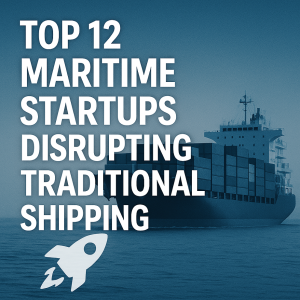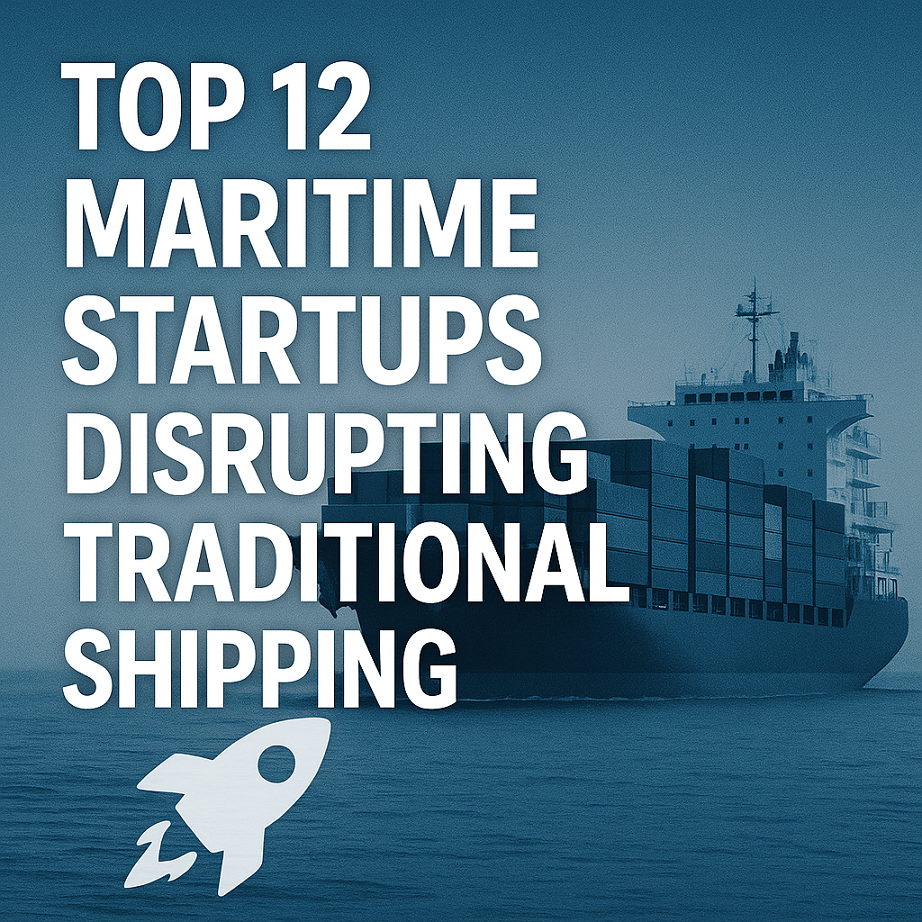
Meet the 12 maritime startups disrupting traditional shipping with AI, blockchain, green fuels, and smart ports. Learn how these innovators are shaping the future of global trade and why shipowners, seafarers, and ports should pay attention.
Innovation on the Horizon 🌊
For centuries, shipping has been conservative by design. Vessels were slow to change, regulations careful, and investments cautious. But in the last decade, a wave of maritime startups has emerged—young companies blending shipping knowledge with modern technologies like artificial intelligence, blockchain, green fuels, and the Internet of Things (IoT). The timing is not accidental. According to UNCTAD’s 2023 Review of Maritime Transport, the industry faces unprecedented pressure: IMO’s decarbonisation targets for 2030 and 2050, supply chain digitalisation, and rising geopolitical risks. Traditional models struggle to keep up. Startups, however, are stepping into this space with agile, tech-driven solutions that promise to cut emissions, reduce costs, and enhance transparency.
This article explores the 12 maritime startups that are truly disrupting traditional shipping, highlighting their innovations, impact, and potential to reshape the future of global trade.
Why Maritime Startups Matter in Modern Shipping
- Decarbonisation – The IMO’s GHG Strategy 2023 sets ambitious emission cuts. Startups developing carbon capture, alternative fuels, or wind-assist technologies are critical.
- Digitalisation – Platforms for predictive maintenance, crew management, and cargo visibility help operators comply with stricter EU MRV and IMO DCS reporting requirements.
- Transparency & Trust – Blockchain-based platforms reduce fraud in bills of lading and boost supply chain reliability.
- Crew Welfare – ISWAN reports rising mental health challenges at sea. Startups offering telemedicine, e-learning, and welfare platforms improve seafarer resilience.
–
Top 12 Maritime Startups Disrupting Traditional Shipping
1. MaritimEducation (www.maritimeducation.com) – Maritime Knowledge Platform
MaritimEducation provides a comprehensive online platform for maritime professionals, offering courses, industry news, and resources for career development.
👉 Impact: Democratizes access to specialized knowledge and supports continuous learning across the global maritime workforce.
2. Nautilus Labs (USA) – AI for Fuel Efficiency
Nautilus Labs uses AI to optimise voyage planning, trim consumption, and reduce emissions. By integrating data from onboard sensors with weather routing, it helps shipowners cut fuel costs by up to 15%.
👉 Impact: Aligns with IMO CII ratings and the EU Emissions Trading System (ETS), saving both money and carbon credits.
3. ShipIn Systems (USA) – Visual Fleet Management
Using onboard cameras and AI, ShipIn monitors safety, security, and cargo handling in real time. This prevents accidents and reduces insurance claims.
👉 Impact: Addresses EMSA’s finding that 77% of maritime accidents involve human error.
4. Orca AI (Israel/UK) – Autonomous Navigation Support
Orca AI develops smart navigation systems using computer vision, assisting officers in congested waters. It is seen as a stepping stone toward semi-autonomous vessels.
👉 Impact: Supports COLREGS compliance and reduces risk of collisions, especially in high-density ports like Singapore or Shanghai.
5. ZeroNorth (Denmark) – Sustainable Voyage Optimisation
Spun out of Maersk Tankers, ZeroNorth provides digital tools for route optimisation, weather analysis, and carbon footprint tracking.
👉 Impact: Enables owners to balance commercial performance with IMO’s EEXI/CII compliance.
6. Greywing (Singapore) – Crew Change Optimisation
Greywing helps operators manage crew changes, visas, and travel logistics. During the COVID-19 crisis, it was a lifeline for companies navigating restrictions.
👉 Impact: Improves seafarer welfare and reduces crew-change costs—still one of shipping’s biggest logistical challenges.
7. EyeGauge (France) – Engine Performance Analytics
EyeGauge digitises legacy ship engines using sensors, providing real-time performance data without expensive retrofits.
👉 Impact: Affordable pathway for older vessels to meet MRV/DCS reporting and efficiency standards.
8. Seabound (UK) – Onboard Carbon Capture
Seabound is developing compact carbon capture systems for ships, using calcium looping principles to trap CO₂ before release.
👉 Impact: Directly aligned with IMO GHG 2050 strategy, offering owners a retrofit option rather than fleet replacement.
9. CargoX (Slovenia) – Blockchain Bill of Lading
CargoX uses blockchain to create secure, paperless bills of lading. This reduces fraud, saves time, and improves customs efficiency.
👉 Impact: Recognised by the International Chamber of Commerce (ICC) as a pioneer in digital trade documentation.
10. Bound4Blue (Spain) – Automated Rigid Sails
Bound4Blue designs wind-assisted propulsion systems, providing fuel savings of up to 30%. Installed on tankers and bulk carriers, its sails are fully automated.
👉 Impact: Revives the romance of wind in modern, green shipping.
11. Motion Ventures (Singapore) – Maritime VC Ecosystem
Not a startup itself, Motion Ventures funds maritime innovation, supporting dozens of early-stage companies. Its focus on digitalisation and decarbonisation creates an ecosystem for growth.
👉 Impact: Strengthens collaboration between startups and established shipping giants.
12. Orolia Maritime (France/UK) – Next-Gen Safety Tech
Orolia develops advanced GMDSS equipment, distress beacons, and cyber-secure navigation systems.
👉 Impact: Ensures compliance with the SOLAS Convention and provides resilience against cyber threats.
–
Case Studies: Real-World Disruption
-
Maersk & ZeroNorth – Maersk reports fuel savings and better CII ratings after deploying ZeroNorth optimisation tools.
-
Tankers with Bound4Blue Sails – Demonstrated significant fuel reduction in Atlantic crossings.
-
Greywing During COVID-19 – Helped owners reduce crew-change delays by 40% amid global restrictions.
These case studies illustrate that disruption is not abstract—it’s already reshaping costs, compliance, and seafarer welfare.
Challenges and Barriers for Maritime Startups
-
Conservative Industry Culture – Shipowners traditionally avoid untested technology.
-
Capital Intensity – Retrofitting fleets or scaling hardware demands significant upfront investment.
-
Regulatory Complexity – Startups must prove compliance with IMO, class societies, and flag states simultaneously.
-
Cybersecurity Risks – As more vessels connect digitally, exposure to hacking grows.
The Future Outlook 🌍
By 2030, startups will be central to meeting regulatory and market pressures. Expect growth in:
-
Green fuel solutions (ammonia, hydrogen, biofuels).
-
Autonomous shipping support (AI navigation, digital twins).
-
Crew welfare platforms (health tech, training, financial support).
-
Cybersecure smart ports integrating ships, cargo, and customs.
According to Clarksons Research, decarbonisation and digitalisation will attract billions in maritime tech investment this decade. The future of shipping is no longer only about steel—it is about code, data, and innovation.
Frequently Asked Questions
Why are startups important for the maritime industry?
They bring agility and innovation, solving problems like emissions and inefficiencies faster than traditional players.
Do startups work with large shipping companies?
Yes. Many collaborate with giants like Maersk, MSC, and Shell to scale solutions.
Which technology will impact shipping most?
Green fuels, AI-driven optimisation, and blockchain-based trade documentation are leading contenders.
Are these startups recognised by regulators?
Most work closely with IMO, class societies (DNV, ABS, Lloyd’s Register), and P&I clubs to ensure compliance.
How can seafarers benefit from startups?
Through improved safety, better welfare tools, easier crew changes, and reduced emissions that support sustainability.
Conclusion: A New Wave of Disruption 🌊💡
Traditional shipping is built on resilience and caution, but the tides are turning. From carbon capture systems to blockchain bills of lading, startups are not only disrupting but strengthening the industry—helping it navigate toward a cleaner, safer, and more efficient future.
For shipowners, seafarers, and policymakers, these 12 startups represent more than technology. They are signals of transformation. Ignoring them is not an option; engaging with them is the pathway to staying relevant in tomorrow’s shipping world.


THANK YOU